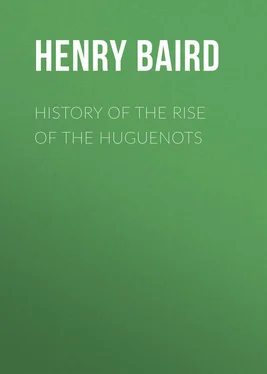Henry Baird - History of the Rise of the Huguenots
Здесь есть возможность читать онлайн «Henry Baird - History of the Rise of the Huguenots» — ознакомительный отрывок электронной книги совершенно бесплатно, а после прочтения отрывка купить полную версию. В некоторых случаях можно слушать аудио, скачать через торрент в формате fb2 и присутствует краткое содержание. ISBN: , Жанр: foreign_antique, foreign_prose, на английском языке. Описание произведения, (предисловие) а так же отзывы посетителей доступны на портале библиотеки ЛибКат.
- Название:History of the Rise of the Huguenots
- Автор:
- Жанр:
- Год:неизвестен
- ISBN:http://www.gutenberg.org/ebooks/30708
- Рейтинг книги:4 / 5. Голосов: 1
-
Избранное:Добавить в избранное
- Отзывы:
-
Ваша оценка:
- 80
- 1
- 2
- 3
- 4
- 5
History of the Rise of the Huguenots: краткое содержание, описание и аннотация
Предлагаем к чтению аннотацию, описание, краткое содержание или предисловие (зависит от того, что написал сам автор книги «History of the Rise of the Huguenots»). Если вы не нашли необходимую информацию о книге — напишите в комментариях, мы постараемся отыскать её.
History of the Rise of the Huguenots — читать онлайн ознакомительный отрывок
Ниже представлен текст книги, разбитый по страницам. Система сохранения места последней прочитанной страницы, позволяет с удобством читать онлайн бесплатно книгу «History of the Rise of the Huguenots», без необходимости каждый раз заново искать на чём Вы остановились. Поставьте закладку, и сможете в любой момент перейти на страницу, на которой закончили чтение.
Интервал:
Закладка:
157
De Thou, iii. 191, etc.; Hist. ecclés. des égl. réf., ii. 64, etc.
158
The number was, in fact, only about 15,000 foot and 3,000 horse, according to De Thou, iii. 198.
159
Although Coligny captured six cannon and over forty wagons of powder, he was compelled reluctantly to destroy, or render useless, and abandon munitions of war of which he stood in great need; for the enemy had taken the precaution to kill or drive away the horses, and the wagons could not be dragged to Orleans, a distance of over twenty miles. It happened that Sir Nicholas Throkmorton, whose instructive correspondence furnishes so lucid a commentary upon the events from 1559 to 1563, was travelling under escort of the royal train, to take leave of Charles IX. at Bourges. In the unexpected assault of the Huguenots he was stripped of his money and baggage, and even his despatches. Under these circumstances he thought it necessary to accompany Coligny to Orleans. Catharine, who knew well Throkmorton's sympathy with the Protestants, and hated him heartily ("Yt is not th' Ambassador of Englande," he had himself written only a few days earlier, "which ys so greatlye stomackyd and hatyd in this countreye, but yt ys the persone of Nicholas Throkmorton," Forbes, ii. 33), would have it that he had purposely thrown himself into the hands of the Huguenots. His confidential correspondence with Queen Elizabeth does not bear out the charge. Despatch from Orleans, Sept. 9, 1562, Forbes, State Papers, ii. 36, etc. Catharine assured Sir Thomas Smith, on his arrival at court as English ambassador, that she wished he had been sent before, instead of Throkmorton, "for they took him here to be the author of all these troubles," declaring that Throkmorton was never well but when he was making some broil, and that he was so "passionate and affectionate" on the Huguenots' side, that he cared not what trouble he made. Despatch of Smith, Rouen, Nov. 7, 1562, State Paper Office.
160
Histoire ecclés., ii. 296-306 (the terms of capitulation, ii. 304, 305); Mém. de Castelnau, liv. iii., c. xi. (who maintains they were implicitly observed); Throkmorton, in Forbes, State Papers, ii. 41; Davila, bk. iii., p. 71; De Thou, iii. 198, 199. "Bituriges turpiter a duce præsidii proditi sese dediderunt, optimis quidem conditionibus, sed quas biduo post perfidiosissimus hostis infregit." Beza to Bullinger, Sept. 24, 1562, Baum, ii., Appendix, 194. M. Bourquelot has published a graphic account of the capture of Bourges in May, by the Huguenots, under Montgomery, and of the siege in August, from the MS. Journal of Jean Glaumeau, in the National Library (Bulletin de l'hist. du prot. fr., v. 387-389). M. L. Lacour reprints in the same valuable periodical (v. 516-518) a contemporary hymn of some merit, "Sur la prise de Bourges." We are told that a proverb is even now current in Berry, not a little flattering to the Huguenot rule it recalls:
"L'an mil cinq cent soixante et deux
Bourges n'avoit prêtres ny gueux." (Ibid., v. 389.)
161
Jean de Serres, De statu relig. et reip., ii. 258, 259.
162
This conclusion was arrived at as early as Aug. 29th. Froude, Hist. of England, vii. 433. Seventy thousand crowns were to be paid to the prince's agents at Strasbourg or Frankfort so soon as the news should be received of the transfer of Havre, thirty thousand more within a month thereafter. The other forty thousand were in lieu of the defence of Rouen and Dieppe, should it seem impracticable to undertake it. Havre was to be held until the Prince should have effected the restitution of Calais and the adjacent territory according to the treaties of Cateau-Cambrésis, although the time prescribed by those treaties had not expired, and until the one hundred and forty thousand crowns should have been repaid without interest. The compact, signed by Queen Elizabeth at Hampton Court, Sept. 20, 1562, is inserted in Du Mont, Corps Diplomatique, v. 94, 95, and in Forbes, State Papers, ii., 48-51.
163
See the declaration in Hist. ecclés. des égl. réf., ii. 415, 416; and Forbes, State Papers, ii. 79, 80. J. de Serres, ii. 261, etc. Cf. Forbes, State Papers, ii. 60, 69-79.
164
Throkmorton to the queen, Sept. 24, 1562. Forbes, State Papers, ii. 64, 65.
165
Froude, ubi supra . In fact, Elizabeth assured Philip the Second – and there is no reason to doubt her veracity in this – that she would recall her troops from France so soon as Calais were recovered and peace with her neighbors were restored, and that, in the attempt to secure these ends, she expected the countenance rather than the opposition of her brother of Spain. Queen Elizabeth to the King of Spain, Sept. 22, 1562. Forbes, State Papers, ii. 55. It is not improbable, indeed, that there were ulterior designs even against Havre. "It is ment," her minister Cecil wrote to one of his intimate correspondents, "to kepe Newhaven in the Quene's possession untill Callice be eyther delyvered, or better assurance of it then presently we have." But he soon adds that, in a certain emergency, "I think the Quene's Majestie nead not be ashamed to utter her right to Newhaven as parcell of the Duchie of Normandy." T. Wright, Queen Elizabeth and her Times (London, 1838), i. 96.
166
Froude, History of England, vii. 460, 461.
167
Catharine to Throkmorton, Étampes, Sept. 21, 1562, State Paper Office.
168
Mém. de la Noue, c. vii.; De Thou, iii. 206, 207 (liv. xxxi). Throkmorton is loud in his praise of the fortifications the Huguenots had thrown up, and estimates the soldiers within them at over one thousand horse and five thousand foot soldiers, besides the citizen militia. Forbes, ii. 39.
169
Cuthbert Vaughan appreciated the importance of this city, and warned Cecil that "if the same, for lack of aid, should be surprised, it might give the French suspicion on our part that the queen meaneth but an appearance of aid, thereby to obtain into her hands such things of theirs as may be most profitable to her, and in time to come most noyful to themselves." Forbes, ii. 90. Unfortunately it was not Cecil, but Elizabeth herself, that restrained the exertions of the troops, and she was hard to move. And so, for lack of a liberal and hearty policy, Rouen was suffered to fall, and Dieppe was given up without a blow, and Warwick and the English found themselves, as it were, besieged in Havre. Whereas, with those places, they might have commanded the entire triangle between the Seine and the British Channel. See Throkmorton's indignation, and the surprise of Condé and Coligny, Forbes, State Papers, ii. 193, 199.
170
In a letter to Lansac, Aug. 17, 1562, Catharine writes: "Nous nous acheminons à Bourges pour en déloger le jeune Genlis… L'ayant levé de là, comme je n'y espère grande difficulté, nous tournerons vers Orléans pour faire le semblable de ceux qui y sont." Le Laboureur, i. 820.
171
Mém. de François de la Noue, c. viii. (p. 601.)
172
Hist. ecclés. des égl. réf., ii. 375, 376, 383; J. de Serres, ii. 181; De Thou, iii. 179-181.
173
It was undoubtedly a Roman Catholic fabrication, that Montgomery bore on his escutcheon a helmet pierced by a lance (un heaume percé d'une lance), in allusion to the accident by which he had given Henry the Second his mortal wound, in the joust at the Tournelles. Abbé Bruslart, Mém. de Condé, i. 97, who, however, characterizes it as "chose fort dure à croire."
Читать дальшеИнтервал:
Закладка:
Похожие книги на «History of the Rise of the Huguenots»
Представляем Вашему вниманию похожие книги на «History of the Rise of the Huguenots» списком для выбора. Мы отобрали схожую по названию и смыслу литературу в надежде предоставить читателям больше вариантов отыскать новые, интересные, ещё непрочитанные произведения.
Обсуждение, отзывы о книге «History of the Rise of the Huguenots» и просто собственные мнения читателей. Оставьте ваши комментарии, напишите, что Вы думаете о произведении, его смысле или главных героях. Укажите что конкретно понравилось, а что нет, и почему Вы так считаете.












